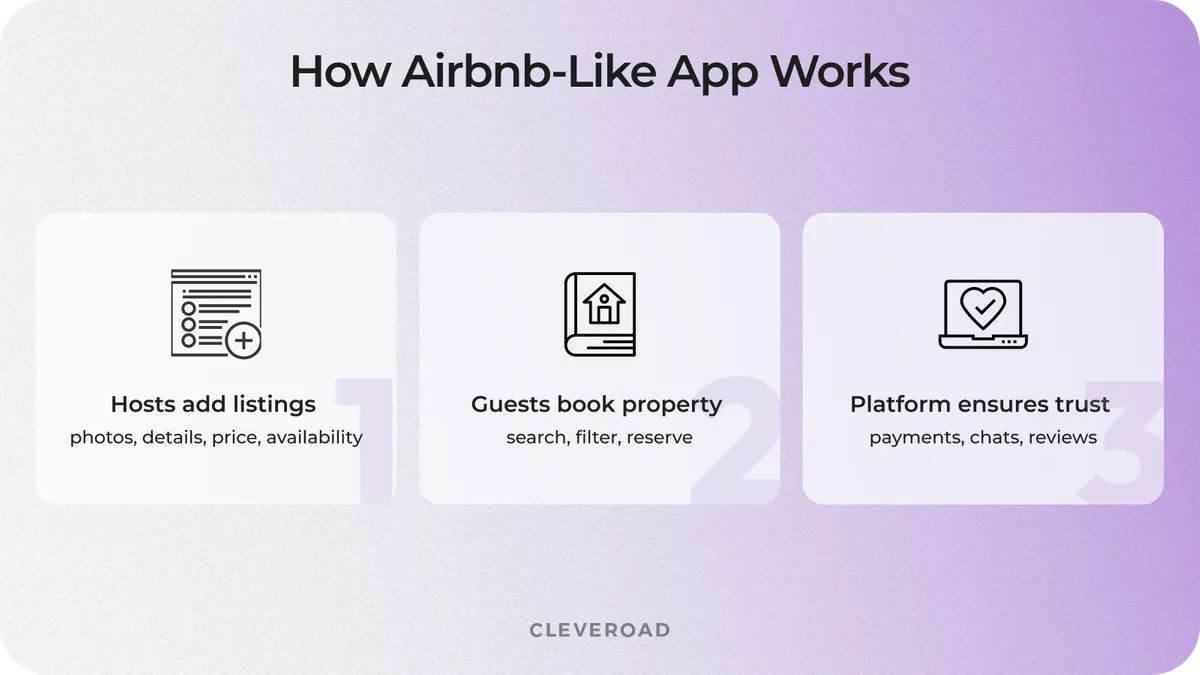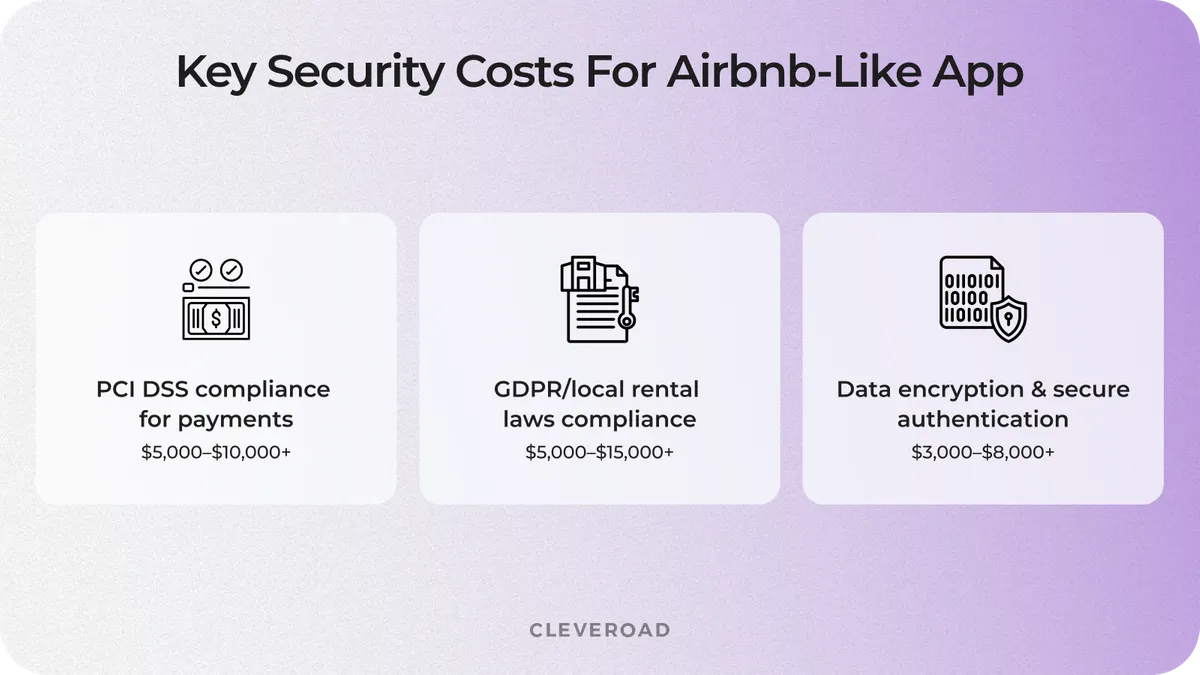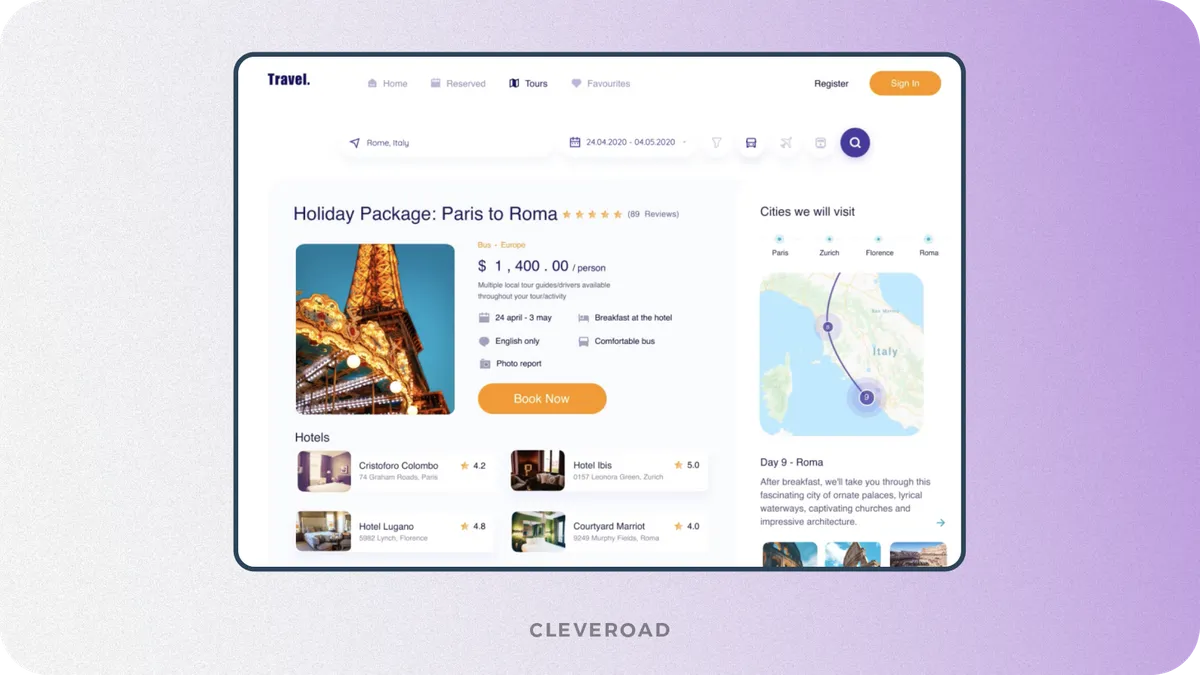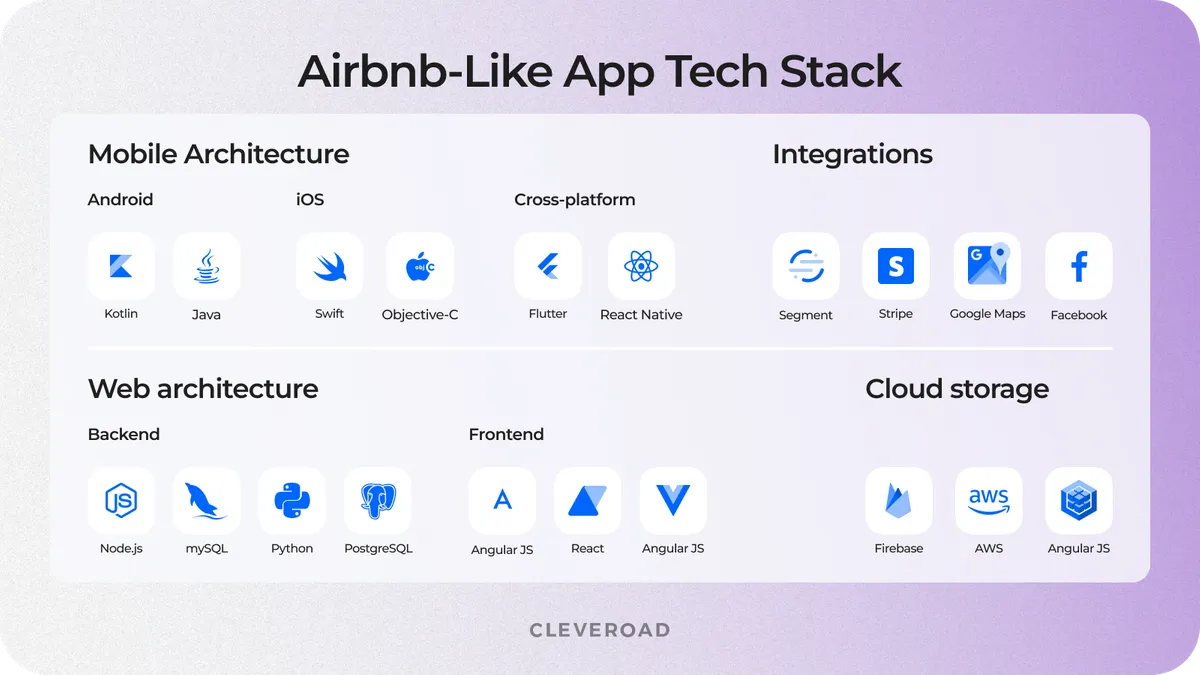How to Build an App Like Airbnb: Cost, Features, and More
Updated 03 Oct 2025
20 Min
20023 Views
Cost to build an app like Airbnb is one of the first questions entrepreneurs ask when exploring the booming sharing economy. With short-term rentals and peer-to-peer booking platforms on the rise, Airbnb remains the benchmark for success, but what does it take to replicate it?
At Cleveroad, we’ve helped dozens of startups and enterprises build marketplace and booking platforms, so we know what it takes to bring an Airbnb-like idea to life. By the end of this article, you’ll understand not only the cost, but also the exact steps, features, and vendor insights needed to create an Airbnb-like app tailored to your market.
Here are a few key cost insights on how to build an app like Airbnb effectively from the start:
- Basic MVP cost: can start at around $30,000–$50,000
- Full-scale marketplace app: with advanced features may exceed $250,000+
- Cost drivers: design complexity, third-party integrations, and platform choice (iOS, Android, or web)
What Is Airbnb and How Does It Work
Airbnb is a global travel app that connects hosts offering short-term stays with travelers looking for unique accommodations. Unlike traditional booking platforms, it focuses on flexibility, variety, and authentic local experiences.
From a product perspective, it’s both a website like Airbnb and a mobile app where users can register, browse listings, compare prices, and make instant bookings. This model is often studied by entrepreneurs considering whether to develop an app like Airbnb or adapt the approach for other verticals such as coworking, tours, or car rentals.
Many startups turn to an app development company vendors to clarify the cost to create such solutions and the feature set required to stay competitive.
The app similar to Airbnb concept works the following way:

How Airbnb-like app works
For companies exploring Airbnb-like app development, this logic explains why tailored booking platforms continue to gain traction. With a reliable development company, the idea can be scaled into a full-featured product.
Major Factors Influencing the Cost to Build an App Like Airbnb
When analyzing the Airbnb business model, it’s clear that costs depend on more than just coding. Factors like publishing on app stores, the complexity of the development process, and whether you want to build a website like Airbnb all play a significant role in shaping the budget. The following key aspects will help you understand what drives these expenses and how to plan effectively.
Platform choice
The platform you choose has a direct impact on the overall cost of your project. When building an Airbnb clone app, native iOS and Android teams ensure high performance but require larger budgets, while cross-platform tools like Flutter help reduce expenses with a single codebase. For a vacation rental marketplace, many founders prefer to start with one platform and expand later.
But if your strategy targets both ecosystems at once, cross-platform is the most cost-effective route. A clear cost breakdown shows:
- iOS apps at $25,000–$60,000+
- Android at $20,000–$55,000+
- Cross-platform builds at $35,000–$70,000+
In practice, travel app development requires balancing user reach, performance, and budget. That’s why understanding how to develop an app like Airbnb starts with careful platform choice.
At Cleveroad, we often recommend Flutter development services for startups to speed up MVP delivery and reduce overall costs. For the Australian Rowing Association, we built Row Nation, a cross-platform fitness app designed to grow the rowing community. By proposing Flutter, we helped the client cut costs and deliver a scalable solution quickly.
Here’s what Georgia Beattie, Director at Australian Rowing Association, says about our collaboration:
Georgia Beattie, Director at Australian Rowing Association, on Successful Partnership with Cleveroad
Feature set
When you decide to create an app like Airbnb, the feature set becomes the main factor shaping the budget. A basic MVP usually includes user profiles, property listings, booking flow, payments, and messaging, which is enough to test the concept and control initial spending. Adding advanced elements such as AI-driven recommendations, AR property tours, or multi-language support increases complexity and cost.
For instance, a simple web app with booking only may cost far less than a mobile-first app with deep personalization. A reliable mobile app development company can help prioritize features for your stage and give a clear development cost breakdown.
Let’s find out more about the functionality of Airbnb-similar application and their cost:
| Travel app feature | Inclusions | Estimated cost range ($) |
Basic MVP | User accounts, property listings, booking system, secure payments, messaging | $40,000–$70,000+ |
Advanced features | AI-powered recommendations, AR property tours, multi-language support, loyalty/rewards | $20,000–$50,000+ |
Enterprise-level set | Custom integrations (CRM, analytics, marketing tools), automated pricing, smart contracts for rentals | $80,000–$120,000+ |
Note: The estimates above do not include the cost of building an admin panel, which can add a significant amount depending on complexity. For an exact calculation tailored to your idea, feel free to contact Cleveroad: our team will prepare a detailed estimate based on your Airbnb-like app feature scope and business needs.
Design complexity
When planning a travel app like Airbnb, design is more than just visual appeal. It defines how easily users navigate, search, and book. A simple template-based web app for travel reduces expenses, but limits customization and brand identity. If you want to create a website or mobile solution that mirrors the seamless Airbnb service, investing in custom UI/UX is the way to go.
Keep in mind: the average cost of custom design is higher, but it directly impacts user retention and conversion rates. Many clients ask “how much it will cost to design an app?” but the answer depends on the feature scope and the level of personalization you expect in Airbnb-like app development.
The average UI/UX design costs are the following:
- Template-based UI/UX: $5,000–$10,000+ (fast delivery, limited flexibility)
- Custom design with animations and branding: $15,000–$30,000+ (unique look, higher engagement)
- Cross-platform design adaptation: $5,000–$8,000+ per platform
- User testing & iteration: $3,000–$7,000+
To give you a clearer picture of how design affects both effort and pricing, our Business Analysts prepared design estimates by platform. It shows the average hours and costs required to build UI/UX for a web app, iOS, and Android when working on an Airbnb-like product.
So, if you make an app like Airbnb, you should prioritize custom UI/UX early to differentiate in a competitive market and avoid costly redesigns later.
| Web travel app | iOS travel app | Android travel app | |
Airbnb-like app design time | 140 h | 150 h | 130 h |
Price range ($) | $7,000–$9,000+ | $8,000–$9,500+ | $6,500–$7,500+ |
Team location and composition
Building a travel app like Airbnb requires a diverse team of specialists, and the region where you hire them heavily impacts how much it will cost. Whether you want to create a mnobile or a web app, you’ll need the same core roles: project manager, analysts, designers, developers, QA, and DevOps. In practice, the average cost varies dramatically between in-house teams in the US and offshore software development vendors in Central and Northern Europe or Asia.
If you aim to create an app like Airbnb or launch an Airbnb service alternative, the right location strategy can lower total costs without reducing quality. For example, Cleveroad team helped startups and enterprises leverage offshore software development to cut costs by up to 50% and still launch marketplace apps that scale globally.
Let’s consider the typical Airbnb like app development team composition and their hourly rates in the major offshore outsourcing destinations:
| Region | Developer rate ($/hour) | Designer rate ($/hour) | QA rate ($/hour) | PM/BA rate ($/hour) |
US/Canada | $100–$150/hour | $80–$120/hour | $70–$110/hour | $100–$140/hour |
Central and Northern Europe | $50–$80/hour | $55–$90/hour | $60–$80/hour | $55–$70/hour |
Western Europe | $70–$100/hour | $60–$90/hour | $50–$80/hour | $70–$100/hour |
Asia | $20–$40/hour | $15–$30/hour | $15–$25/hour | $25–$40/hour |
Companies that outsource or choose nearshore partnerships not only save but also access flexible talent pools, which is essential for scaling complex products like Airbnb. Central and Northern Europe (Estonia in particular) has become an attractive destination for Airbnb app development thanks to their balance of cost and quality. The region offers highly skilled engineers with strong expertise in marketplace platforms, transparent business environments, and competitive rates that are significantly lower than in the US or Western Europe.
Integrations
When businesses ask how much it will cost to launch a marketplace, integrations are often one of the most underestimated elements. The cost of building an Airbnb alternative depends heavily on the ability to connect secure payments, maps, and external services that users already trust. If you plan to create an app similar to Airbnb or any other vacation rental app, these integrations are essential for reliability and convenience.
The cost to make an app like Airbnb can rise quickly if you want to build an app with advanced features such as multi-currency payments, AI-driven fraud protection, ID verification, or real-time map navigation. While there is no one-size-fits-all answer, the approximate cost of adding integrations can vary depending on scope and providers. But it’s a core step if you aim to develop an app like Airbnb that scales globally.
Typical integration costs:
- Payment gateways (Stripe, PayPal, Apple Pay, etc.): $5,000–$15,000+ depending on regions and currencies
- Map integrations (Google Maps, Mapbox): $3,000–$7,000+ with additional costs for geofencing or AR navigation
- Third-party services (CRM, chat, analytics, KYC/ID verification): $2,000–$10,000+ per integration
- Advanced fraud detection or compliance APIs: $5,000–$12,000+
At Cleveroad, we help clients integrate reliable 3rd-party services (e.g., Google Maps, Here Maps, NFC, Noonpayments, etc.) that keep travel app users engaged and secure while optimizing costs. If you’re considering an Airbnb-style platform, our team can guide you through the right integrations to balance user experience, compliance, and budget efficiency.
Learn how to build a hotel booking app in our detailed guide covering core features, monetization models, and development cost
Scalability and infrastructure
When you build an Airbnb-like platform, scalability is one of the most critical success factors. The way your app works under growing loads directly affects customer satisfaction and retention. The Airbnb founders initially struggled with scaling, but their shift to cloud-based systems became a blueprint for others learning how to develop an app like Airbnb.
If you want to build a travel solution, it’s vital to plan not only features but also infrastructure. The app development process can take months, and the time to build an app depends heavily on how future-proof the architecture is. Many startups explore Airbnb clone app development, but only teams with experienced app developers can ensure that the product is stable, secure, and ready for rapid growth.
Scalability factors that affect costs:
- Cloud hosting (AWS, Google Cloud, Azure): $1,000–$5,000+/month at MVP stage
- Database design and setup (SQL/NoSQL, sharding, caching): $5,000–$15,000+
- Load balancing & scaling tools (NGINX, Kubernetes, auto-scaling groups): $3,000–$10,000+
- Monitoring & performance optimization tools (Datadog, New Relic): $2,000–$7,000+
- Disaster recovery and backup strategies: $3,000–$8,000+
Skipping scalability early often results in expensive re-engineering, while well-planned infrastructure lets your business grow without interruptions. Our experts always build systems with scalability in mind, ensuring they can handle growing data volumes and user loads seamlessly. As an AWS Select Tier Partner, we leverage top-tier AWS technologies to create scalable, secure, and reliable infrastructures tailored to the needs of logistics enterprises.
Security and compliance
When you build an Airbnb-like marketplace, security is not just a feature but the foundation of trust. Since the app works with sensitive user data, payments, and property information, following strict compliance rules is mandatory. The Airbnb founders invested heavily in building user confidence by ensuring safe transactions and transparent policies, and anyone who wants to build an app like Airbnb should follow the same approach. The cost and time to build an app for travel and hospitality often increase when you include compliance requirements, but skipping them can lead to legal risks.
With Airbnb-similar app development, entrepreneurs need experienced developers who understand both regulations and the app development process, as compliance is a critical part of how to develop an app like Airbnb.
Key security and compliance expenses are the following:

Key security costs for Airbnb-similar application
QA and testing needs
When you make an app like Airbnb, testing becomes one of the most critical cost drivers because reliability directly impacts trust and bookings. QA ensures that features like search filters and payment integrations work seamlessly under different conditions. For a property rental app, even minor bugs can lead to lost reservations and poor user reviews.
Since Airbnb offers smooth performance across millions of users, startups must aim for the same standards if they want to build a successful product. This makes it essential to invest in comprehensive QA from the very start and continue to make the app stable through regular test cycles.
| Type of testing | Description | Estimated cost range ($) |
Functional testing | Verifies booking, payments, messaging, and listings work as expected | $5,000–$10,000+ |
Load & performance testing | Ensures app can handle spikes in user activity and peak seasons | $5,000–$12,000+ |
Security testing | Includes penetration tests, data encryption validation, fraud prevention | $7,000–$15,000+ |
Cross-platform or device testing | Validates performance on iOS, Android, tablets, and different browsers | $3,000–$8,000+ |
Post-launch support
Launching your platform is only the first step; the real challenge begins afterward. Even when you calculate the cost to build a website, ongoing expenses for maintenance and scaling are just as critical. If you plan to build an app like Airbnb, remember that continuous improvements keep your product competitive in the App Store and Google Play.
Updates for essential features like property listings or payments are inevitable as user expectations evolve. To truly make a travel app succeed, you must consider the app development lifecycle beyond launch, since you’ll constantly need to build new features and ensure compliance with security standards. That’s why Airbnb has gained long-term trust: by investing heavily in infrastructure, updates, and user experience.
| Post-launch activity for Airbnb-like app | Cost range per month/year | Notes |
Bug fixing & regular updates | $2,000–$5,000+/month | Fixes for crashes, UI issues, API updates |
Feature scaling | $10,000–$30,000+ annually | Adding personalization, AR tours, or loyalty systems |
Cloud/server support | $1,000–$3,000+/month | Covers hosting, database management, monitoring tools |
App Store & Google Play compliance | $500–$2,000+ annually | Costs for meeting store guidelines, version submissions, certificates |
Security patches & audits | $3,000–$7,000+ annually | PCI DSS, GDPR updates, penetration testing |
Managing all these cost-forming factors, from platform choice and design to integrations, scalability, and compliance, requires both technical expertise and strategic planning. At Cleveroad, we can help you navigate each stage and optimize budgets, delivering Airbnb-like solutions that are secure, scalable, and cost-efficient, ensuring long-term success beyond the initial launch.
Airbnb App Features and Their Cost
If you want to know how to build a platform like Airbnb, you first need to understand which features are essential for user trust and which advanced options can set your product apart. Each functionality directly impacts not only user experience but also development costs.
We’ll break down the must-have and advanced Airbnb app features with a clear view of how they shape the budget.
Travel app features for guests
Guest-facing functionality is what makes a booking platform intuitive and trustworthy. To develop an app like Airbnb, you need to provide smooth onboarding, convenient search, and secure payments. These are the features that shape both the user experience and the project budget:
Registration. To start using an app like Airbnb, the client needs to sign up. The basic option is to provide users with email and password registration. Additionally, it’s necessary to create a ‘Term and Policy’ screen since users have to agree with the policy of use.
Login. After the registration, users need to log into the app easily. So, it’s better to provide them with several options like login with email, Google account, and Facebook. Each integration takes approximately 8 hours of development for one platform. Additionally, there should be such functions as ‘Forget password’ and ‘Log out’ to make an app like Airbnb user-friendly.
Search. This function is vital for any booking service. It’s better to provide an advanced search system at once. Users should have an opportunity to set dates of their trip and select the number of guests. After setting the date, users should see a list of suitable apartments with all the details like photos, descriptions, comments, and more.
Additionally, renters need to select the appropriate accommodation, check it's availability, and send the booking request.
Favorites. This feature offers users to add places they like to the list. After that, they can find these accommodations faster.
Chats. After requesting a stay, the guest and host can start a conversation to discuss all the details. It’s common to provide opportunities to send a photo or video. Additionally, developers can add various statuses like typing, reading, etc.
Profile. Airbnb-like app has two types of users: guests and hosts. Both of them need to have an opportunity to edit their profile and add required personal data like full name, age, sex, and so on.
Payments. How to make an app like Airbnb successful? It’s good to offer users various payment methods to make this process easy and secure. Also, there should be opportunities to add and remove credit cards.
Order. The last core feature of any booking service is requesting a stay. The users choose the flat or house to stay in and can book it if the accommodation is available on the selected dates.
All the estimations provided below are based on the average rate in our region (Central and Northern Europe, Estonia) — $50 per hour.
| Airbnb-like app feature | Web (h) | iOS (h) | Android (h) | Estimated cost ($) |
Registration | 19 hours | 13 hours | 13 hours | $1,800–$2,700 |
Login | 43 hours | 35 hours | 35 hours | $4,500–$6,800 |
Search | 158 hours | 122 hours | 122 hours | $16,000–$24,000 |
Favorites | 12 hours | 15 hours | 15 hours | $1,600–$2,600 |
Chats | 163 hours | 127 hours | 127 hours | $17,000–$25,500 |
Profile | 32 hours | 15 hours | 15 hours | $2,100–$3,400 |
Payments | 26 hours | 24 hours | 24 hours | $3,000–$4,500 |
Order | 58 hours | 38 hours | 38 hours | $6,200–$9,300 |
Total | 511 hours | 389 hours | 389 hours | $52,000–$79,000 |
Travel app features for hosts
The essential features you should include for hosts when make an app like Airbnb, are the following:
Accommodations. How Airbnb works for hosts? The main feature for the landlord is the ability to create an ad about their accommodation. They need to describe all the details like set the apartment type, the number of guests, and more. Additionally, it’s required to allow uploading photos and videos and setting the price per night.
Requests. The owner needs to have a screen with all requests made by travelers. There is also an opportunity to accept and reject any request.
Notifications. This function is useful for any updates to make an app like Airbnb convenient. For instance, the guest made a request, and the owner can get an instant notification. Hosts can also be notified about unchecked requests, booking changes, and more.
GPS. Clients can look through the location where they want to stay in to find apartments, exciting sights, cafes, etc.
| Travel app features | Web (h) | iOS (h) | Android (h) | Estimated cost ($) |
Advertisements | 168 hours | 153 hours | 153 hours | $6,700–$10,000 |
Requests | 30 hours | 16 hours | 16 hours | $1,000–$2,500 |
Push notifications | 24 hours | 14 hours | 14 hours | $800–$2,000 |
GPS | — | 20 hours | 20 hours | $1,200–$2,400 |
Total time | 222 hours | 203 hours | 203 hours | $11,000–$17,000 |
Advanced travel app features
Basic features ensure that your application is intuitive and easy to use, but advanced functionality is what helps it stand out in a competitive travel market. Popular advanced features include:
- Airbnb Plus: verified, high-quality homes with premium standards.
- Superhost & Superguest programs: rewarding reliable hosts and loyal travelers.
- Multi-language support: reaching global audiences without barriers.
- Currency converter: simplifying international bookings.
- Airbnb Experiences: locals can offer unique activities like guided city tours, bike rides, cooking classes, or wellness retreats, making travel more immersive and community-driven.
When planning Airbnb like app development, adding these advanced features requires extra time and budget, but they also differentiate your platform and drive higher engagement.
| Travel app features | Web (h) | iOS (h) | Android (h) | Estimated cost range ($) |
Airbnb Plus verification | 60 hours | 45 hours | 45 hours | $6,000–$9,000 |
Superhost/Superguest | 50 hours | 40 hours | 40 hours | $5,000–$7,800 |
Multi-language support | 40 hours | 35 hours | 35 hours | $4,000–$6,600 |
Currency converter | 30 hours | 25 hours | 25 hours | $3,000–$4,800 |
Airbnb Experiences | 70 hours | 55 hours | 55 hours | $7,000–$10,800 |
Total | 250 hours | 200 hours | 200 hours | $25,000–$39,000 |
Advanced features aren’t mandatory for an MVP, but adding them later can help your product stand out and attract more users in the long run. They increase development costs yet bring higher value through trust, personalization, and global reach. At Cleveroad, we can help you prioritize which advanced features for a travel app to implement first, ensuring a balance between investment and market impact so their Airbnb-like apps stand out and scale effectively.
Visit our Travel app development services page to explore how we can help you design and scale an Airbnb-like solution tailored to your business goals
6 Steps to Make an App Like Airbnb
How to create an app like Airbnb? There are several vital steps that you need to follow to make your project successful and profitable. Estimating the Airbnb app cost requires careful planning of the development roadmap.
Just like any booking app, success depends on balancing time and cost while ensuring the right Airbnb features are implemented for both hosts and guests. Each stage of the process should focus on quality so the final app meets user expectations and business goals.
Let’s talk more about how to develop an app like Airbnb.
Step 1. Create a business plan
To start, you need a clear software startup business plan that outlines your vision, goals, and resources. This plan should define exactly how Airbnb succeeded with its unique model and what you can replicate or improve. It’s important to include market research, competitor analysis, and your monetization strategy. A solid plan also helps investors understand the potential return on investment. Without it, the project can drift and quickly exceed the expected cost to build an app like Airbnb.
Step 2. Find the developers
The next step is to choose the right team to bring your idea to life. You can work with in-house or outsource software developers, depending on your budget and needs. Internal teams give you direct control, while outsourcing often provides access to a wider talent pool and lower costs. Whichever option you choose, ensure the team has the technical knowledge to build complex booking platforms. They should also be comfortable integrating secure systems and the latest technologies like AI-based personalization or AR tours.
At Cleveroad, we’ve helped startups and enterprises successfully create an app like Airbnb by providing full-cycle development services: from Discovery Phase services to post-launch support. Our team combines domain expertise with flexible cooperation models (e.g., IT Staff Augmentation, Dedicated Development team, Project-based model), so clients can get the right balance of speed, quality, and cost.
Step 3. Build a user-friendly design
Design defines the first impression and retention rate of your application. The Airbnb interface is simple, intuitive, and attractive, which is why it converts so effectively. Opting for expert UI/UX design services ensures smooth navigation and interaction within the app. Clear layouts, engaging visuals, and micro-interactions make the product more enjoyable to use. At this stage, even small details like quiet hours for notifications matter for user satisfaction.
Our designers assist clients in creating design concepts that not only look appealing but also improve usability and conversion. They also focus on aligning business goals with user needs, delivering practical solutions for travel and booking apps. For inspiration, here’s an example of a modern approach to travel UI:

Tour booking platform designed by Cleveroad (source: Dribbble)
Step 4. Develop and integrate core Airbnb app features
You don’t need to implement every function right away; it’s smarter to begin with the essentials. Starting with MVP creation allows you to enter the market faster and gather real feedback from the very early adopters.
The first version should include registration, search, booking flow, user profiles, messaging, and secure payment gateways like Stripe or PayPal. After analyzing how people use these core functions, you can gradually add advanced features such as AI-powered recommendations, multi-language support, or loyalty systems. This step-by-step approach lowers risks, controls spending, and makes it easier to optimize the cost to build an app like Airbnb.
Cleveroad experts help clients choose the right stack for travel platforms, using proven tools like Flutter, Kotlin, Swift, Node.js, and AWS to ensure scalability and security. We also adapt the architecture to your business goals so the product grows smoothly with each update. Below you can see a sample tech stack our experts use for an Airbnb-like application:

Airbnb-like tech stack used by Cleveroad developers
Step 5. Test the travel app
Thorough testing ensures that your platform works smoothly across all devices and operating systems. QA engineers should validate functionality, performance under load, and data security before launch. Quality assurance teams must pay attention to usability issues that can frustrate users. Identifying and fixing bugs early saves significant costs and reputational damage later. In practice, testing also shows whether the app meets both business and technical requirements.
QA engineers at Cleveroad apply automated and manual testing to cover every use case of travel app creation: from booking flow to payment processing. They simulate real-world conditions, check edge scenarios, and verify compliance so your Airbnb-like app is stable, secure, and ready to scale.
Step 6. Release the app and update it regularly
After testing, your booking platform is ready for release. Publishing on the App Store and Google Play requires compliance with their policies, which Airbnb like app development team should prepare in advance. Post-launch, continuous updates with new features and performance improvements are essential to keep users engaged. Monitoring feedback will highlight areas where you can improve or add functionality. This ongoing cycle ensures long-term growth and stability for your travel solution.
How Much Does It Cost to Make an App Like Airbnb? [Final Estimate]
When planning marketplace development, businesses usually want to see a realistic budget range rather than a single number. The cost depends on multiple variables: platform choice, design complexity, feature set, team location, integrations, and ongoing support. A mobile solution targeting one platform (iOS or Android) will always cost less than a full cross-platform or web-based ecosystem. Still, building even a simplified version requires significant investment in design, backend, and security to ensure the app meets user expectations.
Considering all the factors mentioned in the article, the cost to build an app like Airbnb ranges between $65,000 and $95,000+ for a single-platform mobile app. For a web application, the range is broader — from $90,000 to $120,000+ depending on advanced functionality and integrations.
Let’s look through the details.
| Type of work | Web development | iOS development | Android development |
Features for guests | 511 hours | 389 hours | 389 hours |
Features for hosts | 222 hours | 203 hours | 203 hours |
Admin panel (one for all platforms) | 225 hours | ||
Frameworks and libraries integration | 65 hours | 58 hours | 61 hours |
UI/UX design | 140 hours | 150 hours | 120 hours |
Quality assurance | 456 hours | 342 hours | 342 hours |
Project management | 228 hours | 171 hours | 171 hours |
Total time | 1,847 hours | 1,313 hours | 1,286 hours" |
Total price | $92,350 | $65,650 | $64,500 |
An experienced vendor can help you optimize development costs by choosing the right tech stack, prioritizing features, and avoiding unnecessary rework. We’ve guided startups and enterprises through similar projects, and now we’ll share how our team can support you in building an Airbnb-like app efficiently and cost-effectively.
Cleveroad's Expertise in Airbnb-Like App Development
Cleveroad is an experienced travel app development company founded in 2011 with headquarters in Estonia and R&D offices in Poland, Ukraine, the US, and Norway. We specialize in building custom travel solutions and Airbnb-like applications that enhance user engagement, ensure smooth booking flows, and help companies automate daily operations.
Why choose Cleveroad for Airbnb-like app development?
- Proven expertise in Travel & Hospitality software: we design intuitive interfaces, enable real-time availability and pricing, and add localization features to meet diverse audience needs.
- Successful portfolio of travel projects: we've created hospitality software for airlines, hotel chains, and travel agencies helping them to successfully scale their businesses with digital solutions
- Experience with third-party integrations: our engineers seamlessly connect solutions like property management systems (PMS), booking engines, payment gateways (Stripe, Braintree), map services (Google Maps, Mapbox), and analytics tools (Firebase, Amplitude) to ensure your Airbnb-like app runs smoothly and delivers an excellent user experience.
- Full-cycle development services: whether you want to create a new marketplace, modernize an existing app, or expand features, our team delivers end-to-end engineering support.
- Certified quality and security: as an ISO 9001 and ISO 27001-certified company, we guarantee high standards in both software delivery and data protection.
To showcase our hands-on expertise, here’s our recent travel industry project — Web Platform for Searching Travel Activities and Accommodation.
The solution helps travelers design personalized itineraries by combining destinations, attractions, and activities into one adaptive route. The main challenge was building a system capable of processing large amounts of travel data and generating optimized plans based on user preferences. Cleveroad’s travel app development team delivered a scalable MVP with intuitive UI/UX and seamless navigation, ensuring that users could easily build and adjust their trips. As a result, our client received a reliable and engaging application that simplifies travel planning while keeping the product flexible for future growth.
This is what Sylvain Labattu, Founder of Koralgo, says about working with Cleveroad:


Ready to make your Airbnb app?
Book a free call with our Business Analyst to discuss your project. You’ll receive a detailed cost estimate, development timeline, and a custom solution plan tailored to your travel app MVP
The cost to build an app like Airbnb ranges between $65,000 and $95,000+ for a single-platform mobile app (iOS or Android). If you plan to create a web application, the budget is typically higher — from $90,000 to $120,000+, depending on integrations and advanced features. The final price always varies based on platform choice, design complexity, and the scope of functionality you want to implement.
App design directly influences development cost because more complex and custom UI/UX design requires additional time for research, prototyping, and implementation. While template-based layouts reduce expenses, unique interfaces with animations, branding, and user testing can significantly raise the budget. Investing in thoughtful design, however, pays off by improving retention and conversions, which offsets the higher upfront cost.
To build an app like Airbnb, you’ll need a cross-functional team covering all stages of development. A typical lineup includes a Project manager, Business analyst, UI/UX designer, iOS/Android (or Flutter) developers, Backend developers, QA engineers, and DevOps specialists. This structure ensures the product is well-designed, technically solid, thoroughly tested, and ready to scale.
Yes, it’s possible to reduce both the time and cost of developing an app like Airbnb by starting with an MVP that focuses only on the most essential features. Partnering with an experienced development team helps you choose the right tech stack and integrations, avoiding costly rework. Using cross-platform frameworks and proven third-party services can also speed up delivery while keeping the budget under control.
Airbnb was originally developed in 2007 by its co-founders Brian Chesky, Joe Gebbia, and Nathan Blecharczyk in San Francisco. The first version of the app was a simple website that allowed people to rent out air mattresses in their apartments during local events. Over time, the platform evolved with the help of early engineers and designers into the full-scale global booking marketplace we know today.

Evgeniy Altynpara is a CTO and member of the Forbes Councils’ community of tech professionals. He is an expert in software development and technological entrepreneurship and has 10+years of experience in digital transformation consulting in Healthcare, FinTech, Supply Chain and Logistics
Give us your impressions about this article
Give us your impressions about this article
Comments
6 commentsThank you for providing such valuable information here!
Thank you Cleveroad for an amazing article. Really appreciate your efforts.
Great article. I'm an engineer in another field, and this article gave me the orientation I needed. Thank you.
Very comprehensive and extremely useful.

This blog has so much valuable information and has really given good foundations in which direction to even start when trying to turn an idea into a useful tool in the real world. Incredible work! Thank you for your time and effort that went into this Katherine. Kind regards, Aaron.

It’s amazing...
